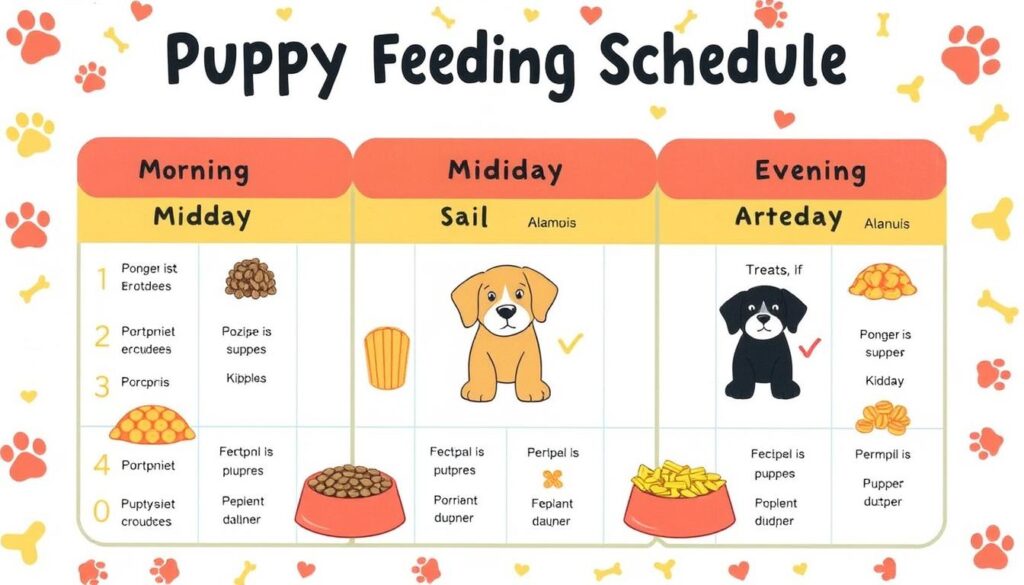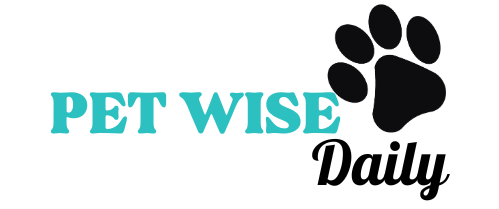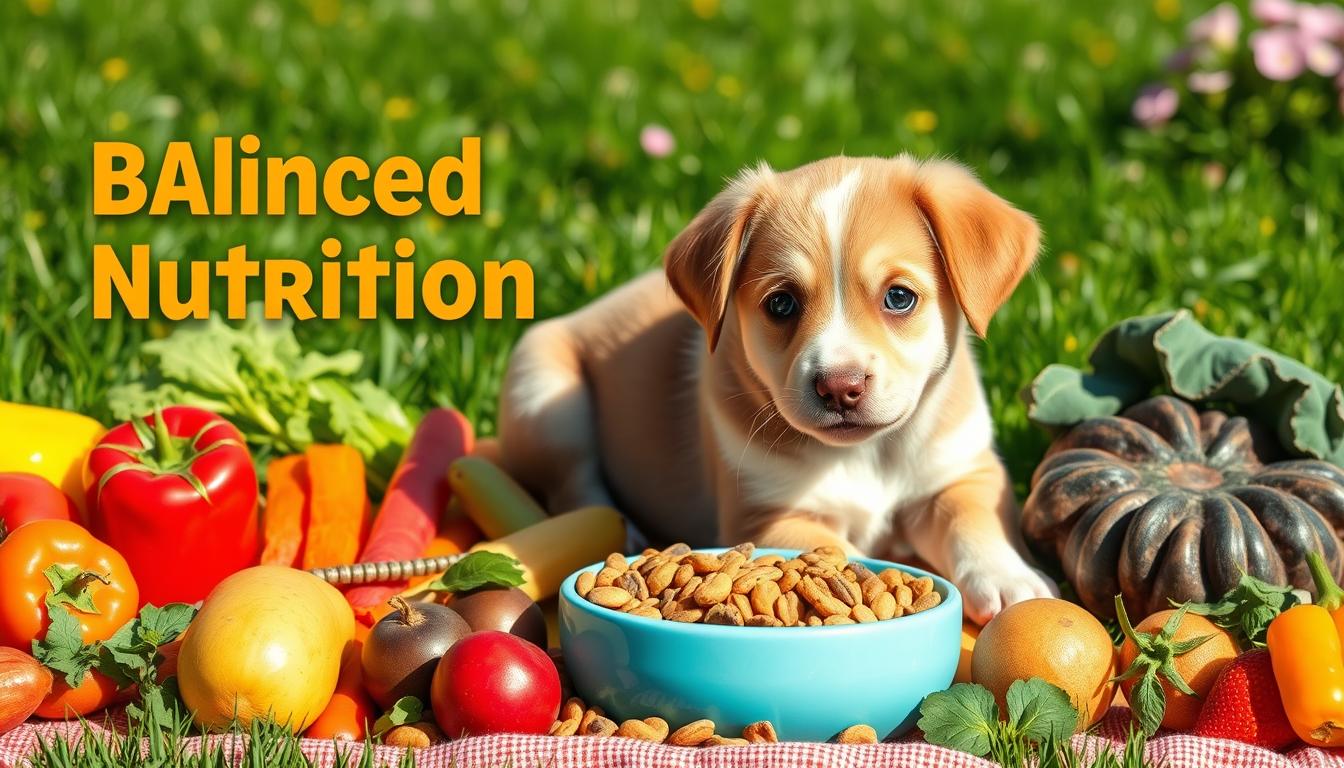As a proud pet parent, you want the best for your furry friend. Deciding if your puppy should eat adult dog food is a big choice. Puppies need special food that’s different from adult dogs to grow right.
This guide will show you why puppy food is better than adult food for them. We’ll talk about the dangers of giving puppies adult food. And why it’s key to give them the right food for their growth stages. Knowing what your puppy needs helps them stay healthy and reach their full potential.
Table of Contents
Understanding the Nutritional Needs of Growing Puppies
Knowing what puppies need to eat is key for their health. Puppies need more calories and protein than adult dogs. They should get up to 22% of their calories from protein, compared to 18% for adults. They also need more fats, about 8.5% of their calories, than adult dogs do.
Important nutrients like calcium (1%) and phosphorus (0.8%) are crucial. They help with fast growth, strong bones, and brain development in the first three years of life.
Essential Nutrients for Puppy Development
Puppies need a balanced diet for their growth. This includes puppy nutrition like:
- Protein for muscle growth and repair
- Fats for energy, coat health, and brain development
- Carbohydrates for energy and digestion
- Calcium and Phosphorus for strong bones and teeth
- Vitamins and Minerals for health and well-being
Caloric Requirements for Different Growth Stages
Puppies need different amounts of calories based on their age and size. Young puppies, especially small breeds, need three to four meals a day. This helps with their fast puppy growth and development.
As they get older, most puppies can eat two meals a day. The exact timing depends on their size and breed.
The Role of Proteins and Fats in Puppy Growth
Proteins and fats are vital for a puppy’s growth. Proteins help with muscle growth, repair, and health. Fats give energy, improve coat health, and aid in brain development.
Getting the right mix of these nutrients for puppies is crucial. It sets the stage for a healthy adult dog.
Key Differences Between Puppy Food and Adult Dog Food
It’s important to know the differences between puppy food and adult dog food. Puppy food helps young dogs grow fast. Adult dog food keeps grown dogs healthy.
Puppy food has more calories and nutrients like protein and vitamins. It’s made for growing teeth and jaws. Adult dog food helps grown dogs stay healthy but lacks the nutrients puppies need.
| Nutrient | Puppy Food | Adult Dog Food |
|---|---|---|
| Protein | Minimum 22.5% | Minimum 18% |
| Fat | Minimum 8.5% | Minimum 5% |
| Vitamins & Minerals | Higher concentrations | Lower concentrations |
The Association of American Feed Control Officials (AAFCO) sets these standards since the 1990s. They ensure puppies and adult dogs get the right food. Knowing these differences helps your puppy grow right.
Can Puppies Eat Adult Dog Food: Risks and Concerns
Feeding your puppy adult dog food might seem like a good idea. But, it’s crucial to know the risks. Puppies need different nutrients than adult dogs. Giving them adult food can harm their health.
Potential Health Issues from Improper Nutrition
Feeding puppies adult dog food can cause nutritional problems. They need more proteins, fats, minerals, and vitamins for growth. Adult dog food doesn’t provide enough for puppies.
This can lead to health issues like allergies and slow healing. Puppies might also get infections more often. These problems come from a diet that’s not balanced for them.
Impact on Growth and Development
Not enough protein can affect a puppy’s muscles and bones. Puppies grow fast and need more protein for their bones and muscles. Adult dog food has less protein, which can slow this growth.
While a little adult dog food won’t hurt, it’s not good to make it a regular part of their diet. Puppies need food made just for them to stay healthy and grow right.
The Importance of Proper Food Sizing for Puppies
Feeding your puppy the right food is key. Puppy kibble is made with smaller pieces. This makes it easy for them to chew and swallow without choking risks.
Adding water or puppy milk to their kibble can make it softer. This makes their meals more enjoyable. It also helps them get the nutrients they need to grow.
- Puppy kibble is smaller in size, making it easier for puppies to chew and swallow
- Adding water or puppy milk can further soften the kibble, making it more palatable
- Proper food sizing helps reduce the risk of choking and accommodates your puppy’s developing teeth and jaws
Keeping a good puppy feeding schedule and giving safe foods for puppies is vital. Knowing about proper food sizing helps your puppy get the right nutrition. This ensures they grow into a happy and healthy adult dog.

Understanding Puppy Food Formulations
Puppy nutrition is key for your furry friend’s growth. Puppy food is made to meet their unique needs. It has more nutrients than adult dog food.
Special Ingredients in Puppy Food
Puppy food has special ingredients for their growth and energy. These include:
- Higher protein content – Puppies need 22% of their calories from protein, more than adult dogs.
- Increased fat levels – Puppy diets have 8.5% fat, more than adult dog food’s 5.5%.
- Calcium and phosphorus – These minerals help with bone development in puppies.
- DHA – This fatty acid is good for brain and vision development in puppies.
- Easily digestible ingredients – Puppy food is made with ingredients that are easy to digest, fitting their sensitive stomachs.
Vitamins and Minerals for Optimal Growth
Puppy food’s balanced nutrients are vital for their growth. It has vitamins and minerals like:
- Vitamin A for vision, immune function, and skin health
- Vitamin B-complex for energy and nerve function
- Vitamin C for a healthy immune system
- Vitamin D for strong bones and teeth
- Calcium and phosphorus for bone and teeth development
- Iron for healthy blood and red blood cell production
- Zinc for wound healing and a healthy coat
Knowing about puppy food’s special formulation helps your pup get the best nutrition.
Transitioning from Puppy to Adult Dog Food
Switching your puppy to adult dog food is a big step in their life. It should happen slowly, usually between 9-24 months. This depends on your dog’s size.
Small puppies, under 10kg, might switch to adult food at 9-12 months. But, big and giant puppies, 25-40kg or over 40kg, should wait until 18-24 months.
Start the transition over 5-7 days. Mix 25% adult food with 75% puppy food first. Then, slowly add more adult food and less puppy food. This helps avoid stomach problems.
Keep an eye on your puppy’s weight and adjust their food portions. Puppies need more protein and fat than adult dogs. Puppies should get 22% of their calories from protein and 8.5% from fat, while adult dogs only need 18% protein and 5.5% fat.
By transitioning slowly and carefully, you help your puppy grow well. This is key for their puppy growth and development during this critical time.

Breed-Specific Considerations for Puppy Nutrition
When it comes to puppy nutrition, one size does not fit all. The nutritional needs of your furry friend can vary significantly based on their breed size. Understanding these differences is crucial to ensuring your puppy receives the essential nutrients for optimal growth and development.
Small Breed vs. Large Breed Requirements
Puppies of small breeds (under 20 pounds as adults) often require a specialized diet. They need smaller kibble sizes to fit their tiny mouths and sensitive digestive systems. On the other hand, large breed puppies (50 pounds or more as adults) may need food that promotes healthy musculoskeletal development. This is to support their rapid growth.
Age-Based Feeding Guidelines
The timing of transitioning from puppy to adult dog food also varies by breed size. Small breed puppies may be ready to switch as early as 6-9 months. Medium breeds (20-50 pounds) can typically make the transition around 12-16 months. Large and giant breed puppies generally require a longer growth period, often waiting until 18-24 months before switching to adult food.
Maintaining a puppy feeding schedule tailored to your pup’s specific needs is essential. It supports their puppy dietary requirements and ensures a smooth transition to adulthood.
Signs Your Puppy Isn’t Getting Proper Nutrition
It’s vital to make sure your puppy eats well for their health and growth. If they’re not getting the right food, you’ll see some signs. These include slow growth, weakness, and a dull coat. They might also have tummy troubles like diarrhea or constipation.
Also, an improper diet can make them more likely to get sick. This shows their immune system is weak.
If you see these signs, talk to your vet right away. A good puppy diet is key for their puppy health and puppy growth and development. Changing their diet early can prevent serious health problems and help them grow strong.
Your vet can help make a diet plan that’s just right for your puppy. By watching for and fixing any diet issues, you can ensure your puppy has a happy and healthy life ahead.

